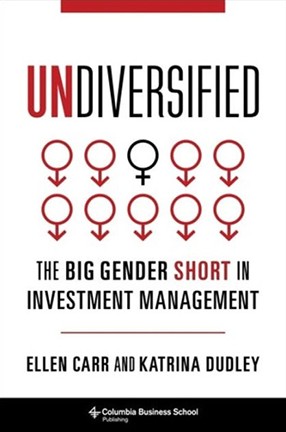Why Aren’t There More Women Money Managers?
A new book, “Undiversified,” spells out the reasons—and they’re probably not what you think—and offers solutions.

Diversification is a core principle of investing. Yet money managers have not applied it to their own ranks. Only around 10% of portfolio managers—the people most directly responsible for investing your money—are female, and the numbers are even worse at the ownership level. What are the causes of this underrepresentation, and what are its consequences—including for firms’ and clients’ bottom lines?
In their new book, Undiversified: The Big Gender Short in Investment Management, Ellen Carr and Katrina Dudley, both portfolio managers who teach at Columbia Business School, examine the lack of women in investment management and propose solutions to improve the imbalance. They discuss the book with Columbia News, as well as why the Me Too movement is not to blame, and who they would like to entertain at a dinner party.
Q. Why did you decide to write this book?
A. The book grew out of our shared puzzlement about why we don’t work with more women. We have a combined four decades of experience in investment management, and we remain depressingly unique.
Additionally, as teachers at Columbia Business School, we have noted that women are underrepresented in our classes, despite an overall student body approaching gender parity. When we reconnected in Central Park a few years ago (we originally met in Los Angeles about 20 years ago), we couldn’t stop talking about the idea for the book—and were excited to collaborate on it given our different backgrounds and perspectives.

Q. What are the main reasons for the lack of women in investment management, and how do you propose remedying the situation?
A. We start by debunking the usual suspects that are relied upon by the media to explain why women are underrepresented in this or any profession. Finance isn’t really a Me Too industry with a lot of bad male actors, and work-life balance is easier to achieve than in other industries (e.g., law, accounting, medicine) that are much closer to gender parity.
Instead, we found in our research and interviews that there are psycho-cultural barriers to women’s participation in the industry. Confidence is critical in investment management—and studies show that women are structurally deficient in this area. Too often we confuse confidence with competence. In terms of risk appetite—both in investing, and in your career—women are perceived to be more risk-averse than men, which means they highlight both the upside and the downside of their investment cases rather than swinging for the fences and pitching those 10 baggers.
Women’s different approach to risk sometimes manifests in their careers as well. First, they might respond to a promotion opportunity (for example, from analyst to portfolio manager) with “tell me more” rather than a more typically male, emphatic “yes.” Second, women are less likely to self-promote from analyst to portfolio manager because the prerequisites for the position are unclear. A well-known Harvard Business School study shows that men apply for a job when they have only 60% of the requirements, while women apply only if they have all of them. While investing didn’t explicitly set out to be male-dominated, a number of the cultural myths and misconceptions surrounding it have combined to create an unintentional bro culture.
Pay, promotion, and performance evaluation in investment management must be equalized. We are careful not to blame men; on the contrary, we found that most men are genuinely interested in changing the demographics of their coworkers.
Successful women in finance need to speak openly and often about their experience, and make sure that young women have role models. And the media needs to cover the industry in a balanced way rather than running sensationalist stories that might be off-putting to women by painting the industry as a hotbed of hedge fund bros who scream and throw phones. Finally, all of us with money invested in mutual funds should be asking our financial advisors for information about the demographics of the funds’ portfolio managers.
Q. Why do you think the Me Too movement has not greatly affected finance?
A. Happily, our industry isn’t at ground zero for this sort of bad behavior. We have not met any Harvey Weinsteins to date (although we might manage money for some of them). The occasional (deliberately sensational?) headline notwithstanding, we don’t believe the movement has made much of a ripple (at least in our segment of the industry) because the issues we face are more subtle, and have a more nuanced set of solutions than, say, moviemaking.
Q. What are you both teaching at Columbia this semester?
A. Ellen is teaching The Art of Forecasting, a crash course on modeling cash flow for companies from a bondholder perspective. Katrina has been a regular guest lecturer for this course to present her approach to cash-flow forecasting.
Q. You're hosting a dinner party. Which three academics or scholars, dead or alive, would you invite, and why?
A. Since we are new writers, we’ll stick with authors for our dinner party!
Michael Lewis: He wrote Liar’s Poker and The Big Short (among many other books). While these books are entertaining, we feel that they perpetuate myths in our industry that might keep women from pursuing a career in investment management (e.g., that some of our “research” takes place in strip clubs). We would love to pitch him on an idea for a book about women investors and their results that paints a truer portrait—and provides women with role models as they consider the career. There is no definitive data on female versus male performance; with Lewis’s level of access and his ability to breathe life into complex stories, he could write the book about the benefits of having a woman manage your money.
Daniel Kahneman: His book Thinking Fast and Slow is must-reading for any investor because it challenges us to understand our biases, and must-reading for any CEO looking to improve diversity because it shows him (or her, but statistically we are talking “him” here) how subtle misperceptions can magnify across a workforce. We would love to pick his brain about his findings with a gendered lens.
Lionel Shriver: Her novel The Mandibles: A Family, 2029-2049 is an economic dystopian tale. Although she has no economic background, the book—which features a hyper-inflationary U.S. dollar, a depression much worse than the Great Depression, and a sharp role reversal for the U.S. and developing markets—is distressingly plausible. We love writers who tackle our opaque industry by creating funny, convincing characters.
Check out Books to learn more about publications by Columbia professors.